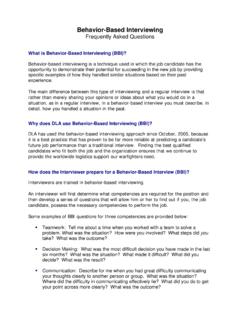Transcription of Tips for Effectively Communicating With a Person Who Has ...
1 tips for Effectively Communicating with a Person Who Has schizophrenia Source: The information below was originally compiled from various NAMI sources. Refer to the website for the original source citations. Effective communication with schizophrenic patients is particularly important because they are so easily overwhelmed by the external environment. Skillful communication can make an enormous difference in the ability of patients and families to resolve the problems of daily living. Good communication involves: 1. Knowing when to communicate 2. Knowing what to communicate 3. Knowing how to communicate. When to Communicate Don't discuss something important when you are angry or upset. It's hard to think clearly, listen well, and focus on constructive solutions.
2 Before talking to your relative, take as much time as you need to calm down. What to Communicate About Since schizophrenia is a serious disorder that affects not only the patient but others around the patient, there are usually several problem areas that family members want to address. Bringing up several problems at once will overwhelm your relative, so it's best to select one problem at a time. Choose one problem area that is really important, then focus on a specific behavior you'd like your relative to change. For ex., say, "John, please stop playing your radio so loudly after 10. " Don't say, "John, you're too noisy at night.". How to communicate Communication has two levels, verbal and nonverbal. Verbal communication is what you actually say.
3 Keep all your verbal communication simple, brief, and specific. Nonverbal communication refers to how you say it--your tone of voice, posture, eye contact, facial expression, and physical distance between speakers. The nonverbal "message" that comes across is often more important than the the verbal message. Disclaimer: provides information about schizophrenia and other psychiatric disease issues to interested parties. This information is not a guide for patient treatment, nor is it meant to provide a substitute for professional advice about medical treatment of the disorder by a licensed physician or clinician. No medical advice is given, nor is any provided on or distributed from this website. No medical advice is provided from information distributed from this website.
4 Users interested in medical advice or treatment must consult a licensed practitioner. No doctor-patient relationship is created through the use of this web site, or any information distributed from this website. Copyright 1996-2005. All Rights Reserved Guidelines for non-verbal communication: 1. Stand close to your relative, but don't crowd his/her personal space. 2. Convey interest, concern and alertness through your body posture and facial expression. 3. Maintain eye contact with your relative. 4. Speak calmly and clearly. Expressing positive feelings. 1. Look at the Person . 2. Say exactly what the Person did that pleased you. 3. Tell the Person how their behavior made you feel. (Bad ex.: "You are nice to have around the house.)
5 " Good ex.: "I like it when you do a nice job cleaning the kitchen"). Making a positive request. 1. Look at the Person . 2. Say exactly what you would like the Person to do. 3. Tell how it would make you feel. 4. Use phrases like "I would like you " or "I would really appreciate it if you ". Expressing negative feelings. 1. Look at the Person . Say exactly what the Person did that upset you. 2. Tell the Person how it made you feel. 3. Suggest how the Person might prevent this from happening in the future. (Bad ex. "You are a frightening Person ." Good ex. "I get very nervous when you pace around the room."). Active listening 1. Look at the speaker. 2. Attend to what is said. 3. Nod head, say, "Uh-huh". 4. Ask clarifying questions. 5.
6 Check out what you heard. Disclaimer: provides information about schizophrenia and other psychiatric disease issues to interested parties. This information is not a guide for patient treatment, nor is it meant to provide a substitute for professional advice about medical treatment of the disorder by a licensed physician or clinician. No medical advice is given, nor is any provided on or distributed from this website. No medical advice is provided from information distributed from this website. Users interested in medical advice or treatment must consult a licensed practitioner. No doctor-patient relationship is created through the use of this web site, or any information distributed from this website. Copyright 1996-2005. All Rights Reserved Following are examples of positive language that you can use STATEMENTS OF ENCOURAGEMENT.
7 Phrases that display confidence "I know you'll do fine.". you can handle it.". I'll trust you will work it out "You'll make it!". Phrases that recognize effort and improvement: "Look at how much you accomplished so far.". "Looks like you put a lot of work into that.". "Looks like you made a real effort.". "You took a lot of time thinking things through.". "You have done more than you realize.". "If you look at your progress, you'll see " (be specific). "It took a lot of courage for you to follow through. ". Phrases that display acceptance: "I like the way you approach that.". "I'm glad you enjoy learning.". "I'm glad you feel good when you succeed.". "You look pleased. I am happy for you.". "Since you are dissatisfied, what could you do to improve the situation so you are more content?
8 ". "I know you're really pleased with it. ". Phrases that acknowledge appreciation, strengths, and contributions: "I really appreciated your help; it made my job a lot easier and I was able to get everything completed.". "Your idea really helped us think things through.". "Thanks, that helped a lot.". "We really need some help, and you have the special skills we need. Would you help?". "I really enjoyed hearing what you had to say. It helped.". "I can use all the help you would be willing to offer.". Disclaimer: provides information about schizophrenia and other psychiatric disease issues to interested parties. This information is not a guide for patient treatment, nor is it meant to provide a substitute for professional advice about medical treatment of the disorder by a licensed physician or clinician.
9 No medical advice is given, nor is any provided on or distributed from this website. No medical advice is provided from information distributed from this website. Users interested in medical advice or treatment must consult a licensed practitioner. No doctor-patient relationship is created through the use of this web site, or any information distributed from this website. Copyright 1996-2005. All Rights Reserv





